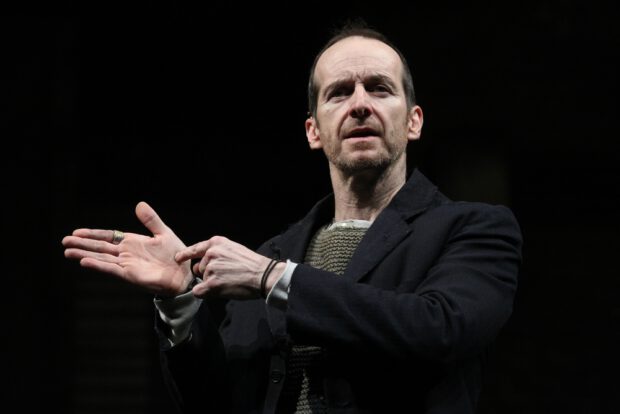Denis O’Hare, in choosing to stage the Iliad – or rather “an Iliad” – as a one-man-act has in fact chosen to encapsulate the multitude in the unique, the myth in the body and the timelessness in the voice. And the spectators cannot help but ask themselves these simple but essential questions: why? and how?
Why adapt the Iliad today? Why turn it into a play? Generous and virtuoso storyteller, the actor draws by his multiple portrayals a human trajectory: behind a war’s spectre and a civilisation’s destruction lie the foundations of a history of violence. This violence is not always wanted, not necessarily shouldered, but nevertheless present over the centuries. And what a dramatic echo the description of Troy in springtime, of its fountains’ murmur and its fig trees’ shade becomes, when mentally associated with the destruction of thousand-year-old cities such as Aleppo?
The actor suggests, without ever becoming assertive. The scenery, very sober, supports his performance. The light and music, alternately violent and caressing, magnify a composition that could easily have turned into a caricature and the temptation to easy laughter. Here, on the contrary, the portraits are nuanced and Denis O’Hare-narrator lets himself be carried away by his own story’s exaltation. The fascination that rage and violence engender spurns the limits of reason. Ridicule and humour lighten this harsh impression that it is indeed by nature that men are violent; the storyteller exclaims, facing his own loss of measure: “That’s why I don’t do this anymore…”.
Ambitious and humble at the same time, the performance involves the audience in the battlefield, reminding the younger generations that they are lucky enough not to know what a front line is. Alternating between narration and characters’ embodiment, the actor doubles or even triples the degrees of his acting: Denis O’Hare plays a storyteller, who plays a character who sometimes monkeys another character. This superimposition, far from cluttering up the actor, sets him free. And it does so without ever making him lose the benevolence defining his heroes-brutes’ portrayal.
An Iliad, therefore, in order to understand what heritage we are the custodians of, in order to grasp the difficulty there is to detach ourselves from it. In order, eventually, to be carried away by the epic breath of these great movements that shaped our conception of mankind. Far from judging them in a way that would be morally anachronistic, Denis O’Hare invites us to travel through time, a time that proves to be much closer than we might have hoped.
For more information see: https://www.theatredurondpoint.fr/spectacle/an_iliad/ (French)
 © Joan Marcus, press photo of the Théâtre du Rond-Point
© Joan Marcus, press photo of the Théâtre du Rond-Point